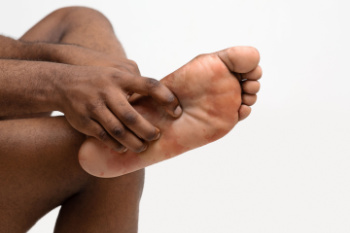
Plantar fasciitis is a common cause of heel pain, often resulting in sharp pain in the bottom of the heel, especially with the first steps in the morning or after prolonged sitting. It occurs when the plantar fascia, a thick band of tissue connecting the heel to the toes, becomes inflamed due to overuse, wearing poor footwear, or excessive pressure. To manage plantar fasciitis, stretching exercises like calf stretches, toe stretches, and plantar fascia stretches can help relieve tension and improve flexibility. Strengthening exercises for the foot and ankle can also aid in recovery. Additionally, wearing supportive shoes and using orthotic insoles can provide extra cushioning and protect the heel from further strain. A podiatrist can recommend personalized treatments, including custom orthotics, and guide you through proper care to prevent recurrence. If you are struggling with heel pain from plantar fasciitis, it is suggested that you schedule an appointment with a podiatrist to develop an effective treatment plan.
Plantar fasciitis is a common foot condition that is often caused by a strain injury. If you are experiencing heel pain or symptoms of plantar fasciitis, contact one of our doctors from Intercoastal Medical Group. Our doctors can provide the care you need to keep you pain-free and on your feet.
What Is Plantar Fasciitis?
Plantar fasciitis is one of the most common causes of heel pain. The plantar fascia is a ligament that connects your heel to the front of your foot. When this ligament becomes inflamed, plantar fasciitis is the result. If you have plantar fasciitis you will have a stabbing pain that usually occurs with your first steps in the morning. As the day progresses and you walk around more, this pain will start to disappear, but it will return after long periods of standing or sitting.
What Causes Plantar Fasciitis?
- Excessive running
- Having high arches in your feet
- Other foot issues such as flat feet
- Pregnancy (due to the sudden weight gain)
- Being on your feet very often
There are some risk factors that may make you more likely to develop plantar fasciitis compared to others. The condition most commonly affects adults between the ages of 40 and 60. It also tends to affect people who are obese because the extra pounds result in extra stress being placed on the plantar fascia.
Prevention
- Take good care of your feet – Wear shoes that have good arch support and heel cushioning.
- Maintain a healthy weight
- If you are a runner, alternate running with other sports that won’t cause heel pain
There are a variety of treatment options available for plantar fasciitis along with the pain that accompanies it. Additionally, physical therapy is a very important component in the treatment process. It is important that you meet with your podiatrist to determine which treatment option is best for you.
If you have any questions, please feel free to contact our offices located in Bradenton, and Sarasota, FL . We offer the newest diagnostic and treatment technologies for all your foot care needs.
